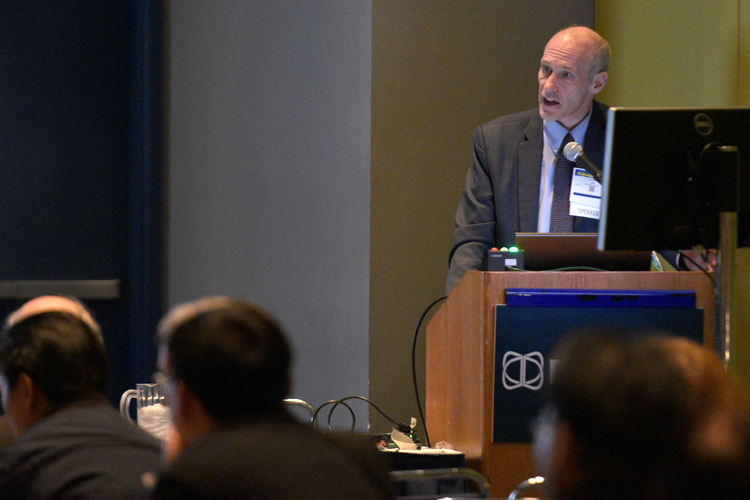Two new strategies are emerging to treat GI and other cancers — engineered T cells and immune checkpoint blockade treatments.

“Both of these therapies can provide lifelong protection,” said Carl June, MD, the Richard W. Vague professor in immunotherapy at the University of Pennsylvania Perelman School of Medicine, Philadelphia. “We have over 10 years of experience and seem to have long-lasting immunosurveillance activity.”
Dr. June discussed the rapidly expanding world of chimeric antigen receptor (CAR) T cells during the GRG Spring Symposium on Sunday at DDW®.
CAR Ts are patient-derived T cells manipulated to express specific antigens unique to target cells. CAR Ts are expanded over 10 days, frozen and delivered to the patient for infusion. Viral vectors are the most common technique, but CRISPR (clustered regularly interspaced short palindromic repeats) is emerging as a more flexible and reliable tool to introduce or delete genetic sequences to create the desired therapeutic effect.
“With genetic engineering, we can hack T cells to make them work more effectively than they do in nature,” Dr. June explained. “CAR Ts are personalized serial killer cells that persist and kill any cell that expresses the target antigen.”
One of Dr. June’s most advanced CAR Ts is CTL019 (tisagenlecleucel-T), which targets CT19 and has been used to treat multiple leukemias. It has also been used to treat metastatic colorectal cancer (CRC) and is awaiting approval from the U.S. Food and Drug Administration.
There are currently than 180 CAR T cell trials underway around the globe. There are 88 trials
in China, 82 in the U.S., and smaller numbers in Europe, Australia and elsewhere.
Survival of patients with for refractory cancers is significantly better with CAR Ts than with conventional therapies. Clinical trials show approximately 80 percent two-year survival in patients with refractory acute lymphoblastic leukemia versus less than 10 percent with clofarabine, the standard treatment.
Work in solid tumors is less advanced. Solid tumors have no clear target like CD19 for B cell malignancies. But CAR Ts that can target a variety of surface antigens in GI cancers, pancreatic cancer and other tumors are under development.
Immune checkpoint inhibitors
Tumors survive by using the programmed cell death protein 1, or PD-1, pathway to block T cell response. PD-1 ligand is expressed on tumor cells and macrophages, binding to PD-1 on T cells, which suppresses immune surveillance and allows neoplastic growth. PD-1 inhibitors such as pembrolizumab and nivolumab bind to PD-1, opening the checkpoint that blocked immune surveillance, allowing T cells to recognize and attach tumors.
Only certain subsets of colorectal cancers are susceptible to immune checkpoint therapy. But when it works, it shows about 89 disease control.
How long the survival benefit lasts is unknown. Patients in the initial FDA approval trials for pembrolizumab have yet to reach progression-free survival or overall survival endpoints.
“We could see almost immediately that these patients were getting better,” said Luis Diaz, MD, head of solid tumor oncology at Memorial Sloan Kettering Cancer Center, New York. “We are seeing high response and durable response. We have dozens of patients in remission after more than two years.”
The problem is that checkpoint inhibitors are only effective in select molecular subsets of tumors. Combinations of checkpoint inhibitors may lead to greater response than single agents, Dr. Diaz said. It may be possible to add other agents that non-immunogenic tumors into an immunogenic form.
“Checkpoint therapy is moving into lower grade CRC,” Dr. Diaz said. “The biggest question is how to define susceptible subpopulations.”


